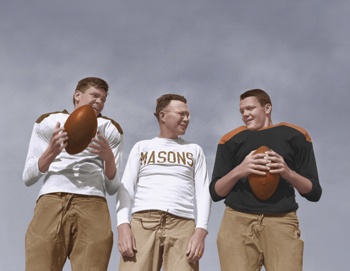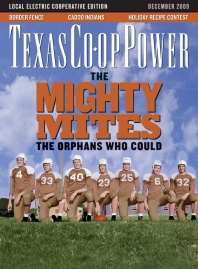One of the most noble experiments in the history of Texas sports took place in 1927 on a rough patch of land not far from downtown Fort Worth. A little band of orphans lined up shoulder to shoulder on a football practice field better suited for grazing goats and began cleaning up the rocks, gravel and prickly pear.
A stranger walking through the gate of the Masonic Widows and Orphans Home that day would have laughed at the sight of the small boys wearing patchwork football uniforms. Only six leather helmets were available to the dozen or so players who showed up for tryouts. A tall, thin, bespectacled man roamed the parched field, taking stock of the youngsters he had recently recruited from the “milk slimes,’’ the boys who milked the cows down at the dairy barn. They hardly looked like football players, and their practice field was in terrible shape. At that moment, Coach Rusty Russell asked himself once more why he had walked away from a decent job at Temple High School, where in 1925 he had led his football team to the state semifinals.
Russell was in Fort Worth to fulfill a promise. A decade earlier, while serving as a medic at the Battle of St. Mihiel during World War I in France, Russell’s platoon had been poisoned by mustard gas delivered in huge doses by German forces. Even after losing his eyesight that day, Russell continued to render aid to his fellow soldiers as he crawled along the ground in virtual blindness. The mustard gas so damaged his eyes that he would spend the next six months in a Paris hospital. His promise to God was to help kids in any way possible the rest of his life if he could just see again.
Now it was time to deliver on that pledge. Russell had stumbled onto this opportunity when a close friend accepted the coaching job at the Masonic Home and then changed his mind. What better way to repay his debt than to counsel, coach and cajole a group of orphans who needed him more than anyone he could ever remember? Here was a bunch of kids who had suffered the trauma of losing one or both parents before being tossed together in a faraway orphanage like so many uprooted weeds. His first day on the job was both disconcerting and a bit depressing, but he would stand firm on this commitment. Even his wife, Juanita, instantly recognized that her husband’s magic might not be sufficient enough to beat these odds.
Juanita said over breakfast one morning that the boys sure didn’t look like football players. In fact, they might not be able to spell “football.”
Russell smiled and said he sensed an unmistakable spirit about them. They were a tough bunch of rascals who would fight each other over nothing.
In spite of the thin resources, Russell never stopped believing. At the Masonic Home, it seemed that everything was either broken or held together by chewing gum and baling wire. At first, the team did not even have a football to practice with, so instead the players used two socks stuffed together. With the 1927 football season approaching, Russell suddenly realized that he did not even have gas money to transport the team to road games, or even the home games, for that matter. He soon learned from Principal Thomas Fletcher that there was no contingency fund.
This news stopped Russell in his tracks. Never could he imagine a scenario of such destitution. He would be transporting a high school team around North Texas in an old Dodge that belched smoke every time he hit the gas. The truck known as “Old Blue’’ had formerly been used to haul hay and pigs. At least he had coaxed a couple of workers at the Masonic Home to build a wooden railing around the truck’s bed so the players wouldn’t fall out of the back on sharp turns.
What transpired in the opening game that season was beyond comprehension. The Mighty Mites traveled west to Mineral Wells to face one of the toughest teams around. Few people gave the Mighty Mites much of a chance against one of the state’s perennial playoff teams. Before the game, Russell approached the Minerals Wells coach and offered a proposition. He said, “I was just wondering, Coach. If we happened to win the game—and I doubt we will—could we possibly take home the game ball?’’
“Sure,’’ the coach said. “We’ve got plenty of footballs.’’
Not only did the Mighty Mites win, but they won big—34-14.
What Russell and the ragtag Mighty Mites accomplished over the next few years was staggering. Russell managed to earn a $250 check from Sherman High for playing an exhibition game at the end of the season, and that money was spent on new footballs, uniforms, and, most important, letter jackets. In virtually no time, Russell built a culture of winning as the Mighty Mites finished that first season with an 8-2 record. One of his players, Abner McCall, would someday become the president of Baylor University and later a justice on the Supreme Court of Texas.
Because his teams were always dwarfed by the competition, Russell built his offense around a spread formation that allowed his players to run through the competition like a bunch of field mice. By lining up players from sideline to sideline, Russell had already invented the spread offense that would become immensely popular in the NFL in the 1980s. It is an offense that now dominates much of the college game.
Five years after entering the Texas Interscholastic League, the Mighty Mites—who were playing at the Class B level—were voted into Class A, the largest classification of Texas high school football, by the District 7A coaches in Fort Worth. In 1932, the Masonic Home, with a high school enrollment of slightly more than a hundred students, would compete against schools with more than a thousand.
The undermanned Mighty Mites went undefeated against the big-time competition and made it all the way to the state championship game in Corsicana, where more than 20,000 fans jammed a stadium built for about 5,000. Many drunken fans encroached on the sideline before local police relented and allowed them to stand behind the offensive huddle and watch the game. In the third quarter, the west stands collapsed. Miraculously, no one was seriously injured. The 0-0 tie, in spite of the lack of offensive production, would be remembered as one of the craziest and most entertaining games in the history of Texas high school football.
With future pro football stars like Hardy Brown and Dewitt Coulter coming into the program, the Mighty Mites would reach the state semifinals in 1934, ’38 and ’40. One of the most memorable games in the state’s history was the 12-12 tie against Highland Park in 1938, when the victory was awarded to the Masonic Home because of a 3-2 edge in penetrations. As the Mighty Mites went deeper into the playoffs that season, the Highland Park fans took up a collection and bought the orphans new black and orange uniforms.
The 1940 season would develop into the most exciting story in the history of Masonic Home football as Brown dominated each game on both sides of the ball, and the Mites reached the semifinals once more against Amarillo High. With the Mites trailing the Golden Sandies 14-7, Brown carried the ball to within inches of the goal on the final play and the dream of another state title died. But as the orphans walked off the field, 12,000 fans began to chant, “Mighty Mites! Mighty Mites!’’
With World War II on the horizon, most of the players were shipped off to the Pacific to become paratroopers. Russell left the Masonic Home for Highland Park, which had been trying to hire him away for years. Never again would the Mighty Mites compete for a state championship on the highest level. But they would never be forgotten.
——————–
Jim Dent is the author of Twelve Mighty Orphans: The Inspiring True Story of the Mighty Mites Who Ruled Texas Football (2007, Thomas Dunne Books). A new film production company, 12 Productions, LLC, has acquired the movie option rights to the book, which is Dent’s sixth.


